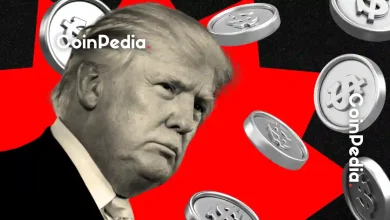
The cryptocurrency market, led by Bitcoin, experienced a significant Sunday selloff, with Bitcoin nearing a retest of its recent low.
Market uncertainty is heightened by U.S.-China trade tensions and President Trump's economic policies, which some compare to Paul Volcker.
Traders are closely monitoring upcoming economic reports and Federal Reserve actions, with the potential for further volatility depending on inflation data.
Another Sunday selloff has hit the crypto market, sending Bitcoin (BTC) tumbling once again. The world’s largest cryptocurrency is now edging closer to its 2025 low of $78,000, sparking concern among investors. In just the past week, Bitcoin has dropped over 11%, wiping out most of its recent gains. As of now, it’s trading at $82,176, down more than 4% in the last 24 hours.
But Bitcoin isn’t the only one feeling the heat – major altcoins are also taking a hit, and market-wide liquidations have surged past $600 million.
Phew. Is more pain on the way?
Altcoins Take a Hit as Market Declines
The broader crypto market has dropped by 7%, bringing the total valuation down to $2.77 trillion. Many major altcoins have also suffered losses:
- Solana (SOL) and XRP fell 7% each
- Ethereum (ETH) dropped 8%, nearing the $2,000 mark
- Cardano (ADA) and Dogecoin (DOGE) lost 7% and 9%, respectively
The market crash led to $616 million in liquidations over the past 24 hours, with long positions taking the biggest hit at $540 million. Bitcoin alone accounted for $231 million in liquidations.
Trump Responds to Recession Concerns
In a recent Fox News interview, President Donald Trump


“I hate to predict things like that,” he said, “There is a period of transition, because what we’re doing is very big — we’re bringing wealth back to America, It takes a little time.”
However, Trump’s Commerce Secretary, Howard Lutnick, firmly dismissed worries about an economic downturn, saying, “Absolutely not,” when asked if Americans should be worried over it.
Tariffs, Budget Cuts, and Economic Disruptions
Trump defended his economic policies, including tariffs and budget cuts, saying that while they may cause short-term disruptions, they are part of a long-term plan.
“There might be some disruption. China has a 100-year plan, while we focus on quarterly results. What we’re doing is laying the groundwork for the future,”
His comments have drawn comparisons to former Federal Reserve Chairman Paul Volcker, who aggressively raised interest rates in the 1980s to fight inflation, even though it led to a recession. Volcker’s actions eventually stabilized the economy, and some believe Trump’s approach could follow a similar path—short-term pain for long-term gain.
Bitcoin Under Pressure
Bitcoin’s decline comes as trade tensions between the US and China are expected to worsen. On Monday, China will impose tariffs on US agricultural goods in response to Trump’s latest import tax increases. This trade war has created uncertainty across financial markets.
BitMEX co-founder Arthur Hayes has warned that Bitcoin could fall further, possibly testing the $78,000 level again. He noted that many Bitcoin options are priced between $70,000 and $75,000, which could lead to more volatility if the price moves into that range.
On Friday, Federal Reserve Chairman Jerome Powell said the central bank would remain cautious about interest rates while assessing the impact of Trump’s policies. His comments came after a weak US nonfarm payrolls report, which reinforced expectations for at least three interest rate cuts this year.
Traders are now closely watching two key economic reports this week:
- The US Consumer Price Index (CPI) on March 12
- The Producer Price Index (PPI) on March 13
These reports could influence Bitcoin’s next move, as inflation data often impacts market sentiment.
What’s Next for Bitcoin?
Bitcoin’s recent drop has divided investors. Some see it as a chance to buy at a lower price, believing the market will recover. Others fear more declines, especially with ongoing economic uncertainty.
A market recovery will likely depend on several factors, including inflation trends, Federal Reserve policies, and regulatory clarity. If Bitcoin can break above $95,000 and economic conditions improve, investor confidence could return. However, the timing of a potential rebound remains uncertain.
The crypto market is no stranger to volatility, but whether this dip is a buying opportunity or a warning sign remains to be seen.
Never Miss a Beat in the Crypto World!
Stay ahead with breaking news, expert analysis, and real-time updates on the latest trends in Bitcoin, altcoins, DeFi, NFTs, and more.
FAQs
Bitcoin could retest $78,000 and may drop to $70,000 if key support levels fail. Market volatility and economic factors will influence future prices.
Bitcoin’s decline is driven by high liquidations, ETF outflows, macroeconomic uncertainty, and U.S.-China trade tensions affecting investor confidence.
Trade tariffs and economic uncertainty increase market fear, impacting Bitcoin. Some compare Trump’s approach to Volcker’s tough inflation policies.









